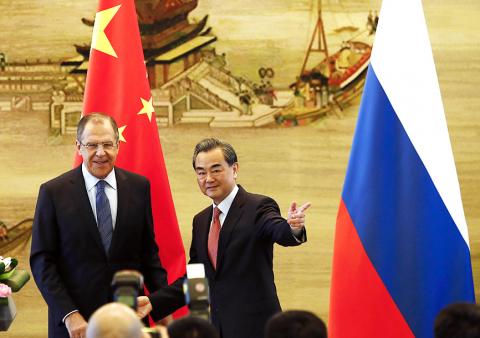China and Russia yesterday criticized US plans to put a missile defense system on the Korean Peninsula, less than 24 hours after Pyongyang twice tested rockets thought to be capable of reaching US territory.
A series of missile tests and nuclear blasts by North Korea have pushed Seoul into talks with Washington about deploying the US’ sophisticated Terminal High Altitude Area Defense System (THAAD), which fires projectiles to smash into enemy missiles.
Beijing fears that the presence of more US hardware on its doorstep would further tip the balance of power in the Pacific toward Washington.

Photo: EPA
“We both are gravely concerned about the US’ likely deployment of the THAAD system in South Korea,” Chinese Minister of Foreign Affairs Wang Yi (王毅) said at a briefing with Russian Minister of Foreign Affairs Sergei Lavrov.
“The move goes beyond the actual defense needs of relevant countries,” Wang said. “It will directly affect the strategic security of China and Russia respectively if it is deployed.”
Lavrov said Washington was using the North’s tests as “an excuse, as a pretext” to deploy what he called Washington’s “global antiballistic missile defense.”
This week’s North Korean rocket tests failed, but Pyongyang has now made three bids in two weeks to test-fly a Musudan missile, which is capable of striking US bases on the Pacific island of Guam.
“The current situation on the peninsula is indeed in a highly dangerous period,” Wang said.
He added that proper implementation of UN resolutions barring the North from developing any ballistic missile-related technology is key to bringing the country to the negotiating table.
China is the North’s biggest trading partner and its key aid provider.
South Korean military officials say the North is desperate to register a successful launch ahead of next week’s ruling party congress, at which North Korean leader Kim Jong-un is expected to take credit for pushing the country’s nuclear program to new heights.
In recent months, the North has claimed a series of major technical breakthroughs in developing what it sees as the ultimate goal of its nuclear drive — an intercontinental ballistic missile capable of delivering a warhead to targets across the continental US.
The achievements trumpeted by Pyongyang have included miniaturizing a nuclear warhead to fit on a missile, developing a warhead that can withstand atmospheric re-entry and building a solid-fuel missile engine.

INVESTIGATION: The case is the latest instance of a DPP figure being implicated in an espionage network accused of allegedly leaking information to Chinese intelligence Democratic Progressive Party (DPP) member Ho Jen-chieh (何仁傑) was detained and held incommunicado yesterday on suspicion of spying for China during his tenure as assistant to then-minister of foreign affairs Joseph Wu (吳釗燮). The Taipei District Prosecutors’ Office said Ho was implicated during its investigation into alleged spying activities by former Presidential Office consultant Wu Shang-yu (吳尚雨). Prosecutors said there is reason to believe Ho breached the National Security Act (國家安全法) by leaking classified Ministry of Foreign Affairs information to Chinese intelligence. Following interrogation, prosecutors petitioned the Taipei District Court to detain Ho, citing concerns over potential collusion or tampering of evidence. The

‘FORM OF PROTEST’: The German Institute Taipei said it was ‘shocked’ to see Nazi symbolism used in connection with political aims as it condemned the incident Sung Chien-liang (宋建樑), who led efforts to recall Democratic Progressive Party (DPP) Legislator Lee Kun-cheng (李坤城), was released on bail of NT$80,000 yesterday amid an outcry over a Nazi armband he wore to questioning the night before. Sung arrived at the New Taipei City District Prosecutors’ Office for questioning in a recall petition forgery case on Tuesday night wearing a red armband bearing a swastika, carrying a copy of Adolf Hitler’s Mein Kampf and giving a Nazi salute. Sung left the building at 1:15am without the armband and apparently covering the book with a coat. This is a serious international scandal and Chinese

Seventy percent of middle and elementary schools now conduct English classes entirely in English, the Ministry of Education said, as it encourages schools nationwide to adopt this practice Minister of Education (MOE) Cheng Ying-yao (鄭英耀) is scheduled to present a report on the government’s bilingual education policy to the Legislative Yuan’s Education and Culture Committee today. The report would outline strategies aimed at expanding access to education, reducing regional disparities and improving talent cultivation. Implementation of bilingual education policies has varied across local governments, occasionally drawing public criticism. For example, some schools have required teachers of non-English subjects to pass English proficiency

TRADE: The premier pledged safeguards on ‘Made in Taiwan’ labeling, anti-dumping measures and stricter export controls to strengthen its position in trade talks Products labeled “made in Taiwan” must be genuinely made in Taiwan, Premier Cho Jung-tai (卓榮泰) said yesterday, vowing to enforce strict safeguards against “origin laundering” and initiate anti-dumping investigations to prevent China dumping its products in Taiwan. Cho made the remarks in a discussion session with representatives from industries in Kaohsiung. In response to the US government’s recent announcement of “reciprocal” tariffs on its trading partners, President William Lai (賴清德) and Cho last week began a series of consultations with industry leaders nationwide to gather feedback and address concerns. Taiwanese and US officials held a videoconference on Friday evening to discuss the